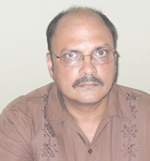HEALTH Minister Dr Bheri Ramsaran has said that the $21.5 billion allocation to the Health Ministry in the 2014 budget would help that ministry to build on its achievements of previous years, and ensure that health services continue being accessible, acceptable, affordable, timely and appropriate.

Speaking on the allocation, he described the budget as an enlightened budget, particularly with respect to an additional $50M allocation which has been given to the Health Ministry to promote health literacy and to carry our outreach programmes to areas where health services are not readily available.
He said the Ministry of Health had made significant achievements in ensuring the well-being of the physical, social and mental health status throughout the life cycle of Guyanese in 2013.
He said that women’s health and that of their children remained on the front burner. In addition, the general population, including able-bodied persons, has been found vulnerable to four main diseases, namely hypertension, diabetes, cancers, and pulmonary (heart) conditions.
He said that prostate cancer in particular was identified as the number one killer of men in Guyana.
The strategy for effectively dealing with these diseases has been outlined in a five-year plan recently released by the Health Ministry, which had launched massive campaigns in fighting certain diseases, including cervical cancer, establishing visual inspection with ascetic acid (VIA) clinics countrywide, and giving free examinations to over 30,000 women to date.
There has also been a satisfactory degree of control over vector-borne diseases such as malaria. Dr Ramsaran said Guyanese enjoy as much as 98% coverage in vaccinations for vaccine-preventable diseases, while child -hood infectious disease such as diarrhoea and dysentery have been overcome.
He said, however, that the main health threats against children under five nowadays were accidents, violence and fires; and there was need for these causes of mortality to be brought under control.
He said that, for example, it was unacceptable for any child under the age of five to be walking along any road — whether in the town or countryside — without supervision.
He disclosed that the Health Ministry had placed heavy emphasis on continuing education and training, to enhance the effectiveness of health personnel, mainly with the help of international centres of excellence.
“We have been able to invest heavily, over the past period, into human resource development and management. Not only did we think of creating a cadre of graduate doctors, but even before they were graduated, we were crafting post-graduate programmes.”
Notable achievements were the successful training of Emergency Medicine Specialists and the creation of an Ambulance Authority.
Commenting on a recently publicised high failure rate among nurses at the Nursing School, Dr Ramsaran said the issue is being analysed at the moment, and the thinking is that it may be a fault in the curriculum, rather than an indication of poor ability of the students.
He said a private nursing school had reported similar percentages of passes and failures, strongly suggesting that the process may be at fault.
Dr Ramsaran disclosed that the Health Ministry had written to the chairperson of the regional nursing body for a review of the curriculum, and the Ministry of Health will also conduct its own in-house investigations into other factors, including allegations of instances of chronic absenteeism by lecturers at the school.
Further, he disclosed that the Ministry of Finance will be giving financial assistance to the Ministry of Health to review the process.
Addressing the issue of expired drugs, Dr Ramsaran said a large number of gift items to the hospitals have been coming into the country with short shelf lives, and the Health Ministry is aggressively addressing the issue of expired drugs, with a view to ensuring that they are safely disposed of.
(By Clifford Stanley)



.jpg)








